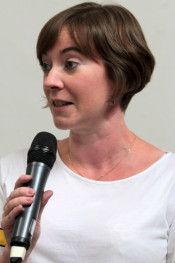Can you earn a living as a poet? Discussion offers advice on how to pay the rent

There is no magic shortcut to making a living as a poet. That warning from discussion panel chair Sarah Hesketh at the Poetry Book Fair in London on Saturday may not have surprised her audience at all. But the discussion that followed involving Hesketh and fellow young poets Richard O’Brien and Rachel Long, pictured right, was full of important advice and useful tips, on subjects such as fees – don’t be shy or sell yourself short, check the Society of Authors rates; approaching organisations with project ideas – don’t expect them to come looking for you; and if you’re self-employed, remember that the books you may have bought at the book fair, the travel costs you incurred getting there, and many other things are all tax-deductible.
Sarah Hesketh was poet in residence with Age Concern working with elderly people with dementia, and assistant director at the literature and free speech charity English PEN. Since 2012 she has worked as a freelance project manager, and currently works for Modern Poetry in Translation magazine, teaches creative writing for the Open University, and is a member of the Society of Authors' poetry and spoken word committee. As she said on Saturday, “you have to end up wearing lots of different hats”.

Rachel Long describes herself as a freelance poet, facilitator, and curator - “I run about all over London, doing jobs in poetry” - and felt there was a way to make a living this way. Running two or three workshops in schools each month can help make ends meet, and pay the rent. She said that most sources of income came from workshops, commissions and residencies, with less money from actual poetry readings. She runs the Octavia poetry collective for women of colour at London’s Southbank Centre.
She said: “My way into working through poetry was by allying myself with organisations, rather than wait for them to notice me.” She said that there were lot of schemes to aid young poets aged 16-25, but “after that it becomes harder”. She went on: “I don’t think that what we do is held in as high esteem as other art forms. They might say that we’re going to pay you with a video of your performance – you can’t pay your rent with that.”

Richard O’Brien admitted that he would work for free “in a lot of circumstances”, but not if it undermined the position of others. But he cautioned against damaging what he described as “a wider poetry ecology”, mentioning small presses and festivals that could not afford to pay much, of anything.
Sarah Hesketh insisted that the question of fees was “important to talk about. You’re often asked to set your own rate, and although you might feel funny about doing that, you have to value yourself.” The Society of Authors could help with questions on rates. Any agreements on fees should be put in writing, she added.
One questioner from the audience asked how the poets saw the financial future developing. Rachel Long added a cautionary note about the involvement of business promoting their products, as in recent TV ads involving poets that might add “depth” to the marketing. “I worry about the effect that has on us,” she said.
Greg Freeman
Background: A good long read! More from the Poetry Book Fair








M.C. Newberry
Sat 7th Oct 2017 15:21
Regarding Laura's comments: I saw a recent late night BBC TV programme featuring performance poetry and a mention
of Attila, if my memory serves me correctly.